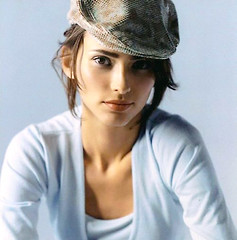The Wyndhams Theatre used to be my favorite theatre in London, with its location right by the Leicester Square tube station, its intimate size, and the fact that several of my favorite plays, include "Copenhagen" and "Democracy" had successful runs there. Of late I've seen two duds in succession; well, one must qualify the the disparagement by pointing out that expectations were high: after all, if you have John Hurt and two other luminaries of the British stage in a play translated by Tom Stoppard ("Heroes"). Similarly, if you have Dama Diana Rigg and Natasha McElhone (pictured) and lots of exclamatory blurbs on tube posters, you gladly hand over £45 and rub your hands in gleeful anticipation.
"Honour" isn't rotten; like I said, it's a dud: it thumps to the ground like something unripened and inedible. It a terrible waste of a great premise, a good cast, and occasional patches of brilliant dialogue. But none of it comes together: the scenes are too short, and the transition between them awkward; the episodic quality is probably meant to make it fast-paced, but the net result is that scenes deliver the punch-line prematurely and ineffectually; without sufficient buildup, what could have been emotional body-blows glance off and hang limply in the darkness while the actors re-arrange themselves on the stage.
The play is about an intellectual couple, married for thirty-two years, whose marriage crumbles when Natasha McElhone's character (I usually buy a programme during the interval if I like the play; this one didn't have an interval, so I can't remember the names of the dramatis personae) invades their cosy intellectual domestic space in the guise of an interviewer having come to do a profile of the husband, flirting outrageously ("I know men want to fuck me"); the scenes of the interview alternate with scenes between him and his wife, during which they exchange smooth ironic repartee, evidently intended to portray a marriage between intellectual equals that has had all its corners and edges worn smooth with time. A logical addition which provides us an extra dimension from which to view the breakup is the a daughter who is roughly the same age as Natasha's character but not quite as clever or worldly, but from whom we learn nothing.
What ultimately lets the play down is its pacing. I can only suppose that, having managed to contract Dame Diana Rigg for the lead role (the man's wife, named Honor), they decided to squeeze as much emotion out of her as possible, so very early on in the play the smooth repartee turns into high-strung single-note emotionalism that simply could not be sustained for the rest of the uninterrupted hour or so after he decides to leave his wife for the willowy young interviewer. I was sitting in the stalls very close to the stage, where I usually like to sit, and despite the raw emotion gushing in floodwaves across the proverbial footlights, I found myself tuning out and thinking of where would be a good place to grab a bite afterwards. The ending, when it came, didn't so much leave me wanting more as made me leave wanting a play that did more. Watching this play is the opposite of seeing a masterpiece in a student production: it was an amateurish piece that a brilliant cast tried their best with. Though I have a sneaking suspicion that even Diana Rigg, while doing her scenes, was wondering if there was anything good on television later tonight.

No comments:
Post a Comment